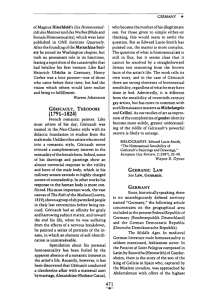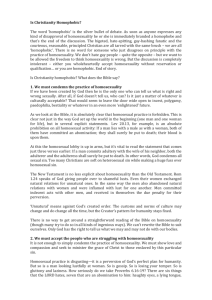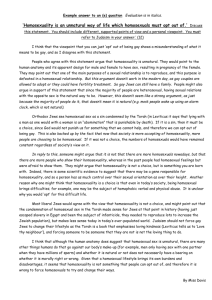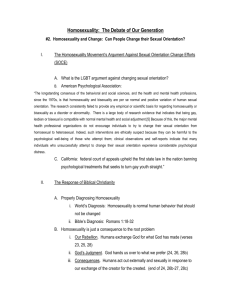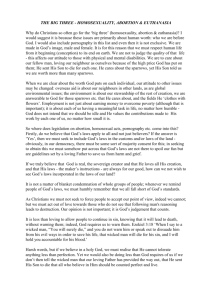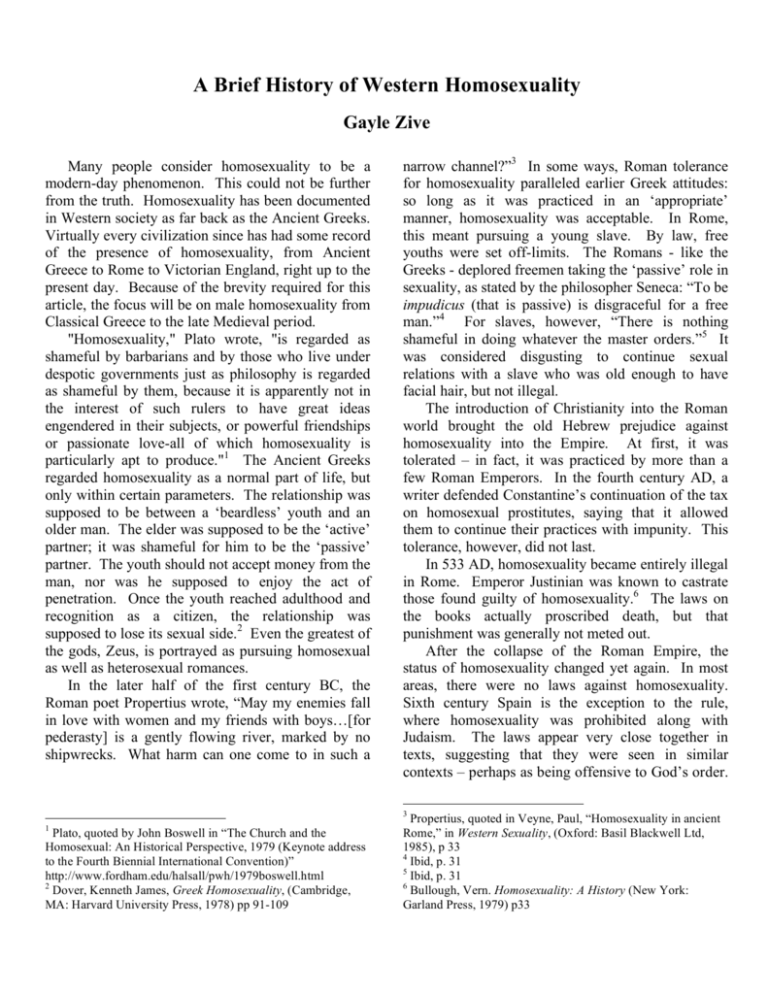
A Brief History of Western Homosexuality
Gayle Zive
Many people consider homosexuality to be a
modern-day phenomenon. This could not be further
from the truth. Homosexuality has been documented
in Western society as far back as the Ancient Greeks.
Virtually every civilization since has had some record
of the presence of homosexuality, from Ancient
Greece to Rome to Victorian England, right up to the
present day. Because of the brevity required for this
article, the focus will be on male homosexuality from
Classical Greece to the late Medieval period.
"Homosexuality," Plato wrote, "is regarded as
shameful by barbarians and by those who live under
despotic governments just as philosophy is regarded
as shameful by them, because it is apparently not in
the interest of such rulers to have great ideas
engendered in their subjects, or powerful friendships
or passionate love-all of which homosexuality is
particularly apt to produce."1 The Ancient Greeks
regarded homosexuality as a normal part of life, but
only within certain parameters. The relationship was
supposed to be between a ‘beardless’ youth and an
older man. The elder was supposed to be the ‘active’
partner; it was shameful for him to be the ‘passive’
partner. The youth should not accept money from the
man, nor was he supposed to enjoy the act of
penetration. Once the youth reached adulthood and
recognition as a citizen, the relationship was
supposed to lose its sexual side.2 Even the greatest of
the gods, Zeus, is portrayed as pursuing homosexual
as well as heterosexual romances.
In the later half of the first century BC, the
Roman poet Propertius wrote, “May my enemies fall
in love with women and my friends with boys…[for
pederasty] is a gently flowing river, marked by no
shipwrecks. What harm can one come to in such a
narrow channel?”3 In some ways, Roman tolerance
for homosexuality paralleled earlier Greek attitudes:
so long as it was practiced in an ‘appropriate’
manner, homosexuality was acceptable. In Rome,
this meant pursuing a young slave. By law, free
youths were set off-limits. The Romans - like the
Greeks - deplored freemen taking the ‘passive’ role in
sexuality, as stated by the philosopher Seneca: “To be
impudicus (that is passive) is disgraceful for a free
man.”4 For slaves, however, “There is nothing
shameful in doing whatever the master orders.”5 It
was considered disgusting to continue sexual
relations with a slave who was old enough to have
facial hair, but not illegal.
The introduction of Christianity into the Roman
world brought the old Hebrew prejudice against
homosexuality into the Empire. At first, it was
tolerated – in fact, it was practiced by more than a
few Roman Emperors. In the fourth century AD, a
writer defended Constantine’s continuation of the tax
on homosexual prostitutes, saying that it allowed
them to continue their practices with impunity. This
tolerance, however, did not last.
In 533 AD, homosexuality became entirely illegal
in Rome. Emperor Justinian was known to castrate
those found guilty of homosexuality.6 The laws on
the books actually proscribed death, but that
punishment was generally not meted out.
After the collapse of the Roman Empire, the
status of homosexuality changed yet again. In most
areas, there were no laws against homosexuality.
Sixth century Spain is the exception to the rule,
where homosexuality was prohibited along with
Judaism. The laws appear very close together in
texts, suggesting that they were seen in similar
contexts – perhaps as being offensive to God’s order.
3
1
Plato, quoted by John Boswell in “The Church and the
Homosexual: An Historical Perspective, 1979 (Keynote address
to the Fourth Biennial International Convention)”
http://www.fordham.edu/halsall/pwh/1979boswell.html
2
Dover, Kenneth James, Greek Homosexuality, (Cambridge,
MA: Harvard University Press, 1978) pp 91-109
Propertius, quoted in Veyne, Paul, “Homosexuality in ancient
Rome,” in Western Sexuality, (Oxford: Basil Blackwell Ltd,
1985), p 33
4
Ibid, p. 31
5
Ibid, p. 31
6
Bullough, Vern. Homosexuality: A History (New York:
Garland Press, 1979) p33
In general, early medieval rulers generally did not
attack homosexuality directly. Even Charlemagne
did not legislate against homosexuality, despite the
fact that he was greatly upset when he discovered that
some of the monks in his kingdom were practicing it.
From guides to penances distributed throughout
Europe, it appears that homosexuality was viewed no
more harshly than other types of extramarital sex.7
That is to say, the lack of persecution most certainly
did not denote approval, as was seen in Greece and to
a lesser extent in Rome. It was simply no worse than
any other sex act committed outside of marriage.
The 12th century is regarded as a sort of ‘little
Renaissance’. There was a sudden flourish in
scholarship, and at the same time an increased
tolerance for homosexuality. It is during this period
that a series of poems about Ganymede – Zeus’s male
lover – were written in Latin, the language of
scholars and educated individuals. However, this
increase in tolerance was short lived.
It is the late medieval philosopher Thomas
Aquinas who brings homosexuality into the notoriety
that persisted until very recently, and continues albeit
on a lesser level. In his writings, Aquinas described
homosexuality as the worst of sexual sins. He argued
that homosexual sex acts are the “greatest sin among
the species of lust” because they are contrary to the
natural order of things as ordained by God.8 For
better or for worse, Thomas Aquinas’s position as a
major Christian philosopher has caused this view to
be assimilated into Western society. The Inquisition
charged and tried people for sodomy – the medieval
word for ‘unnatural’ or ‘unusual’ sex acts – along
with its infamous trials for heresy. Homosexuality
was held in such low regard that in Florence and
other Italian cities, municipal brothels were opened to
“[turn] men away from homosexual practices.”9 In
14th century Florence and Venice, men were put to
death for sodomy.
This medieval heritage of intolerance continues to
affect the West today. True, homosexuality is no
longer a crime to be punished with death or
castration. It has not, however, returned to the preImperial Christian levels of acceptance, even in the
United
States.
8
7
Boswell, John Christianity, Social Tolerance, and
Homosexuality (Chicago: University of Chicago Press, 1980)
chapter 7
Aquinas, Thomas Summa Theologica, II-II
Karras, Ruth Mazzo, Common Women: Prostitution and
Sexuality in Medieval England (New York: Oxford University
Press, 1996), 32
9
3

